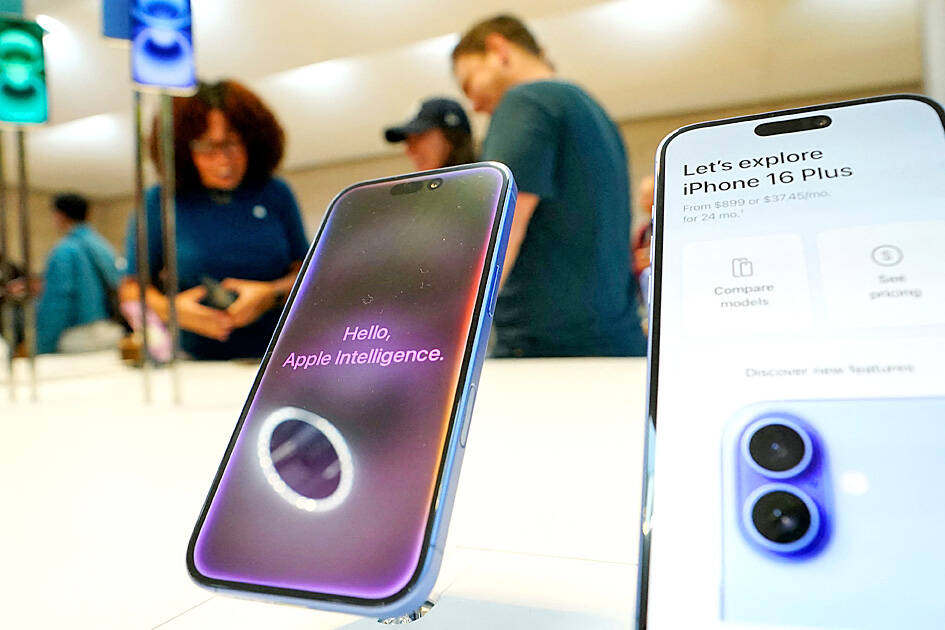Apple Inc lost its status as the best-selling smartphone brand in the crucial Chinese market last year, new data showed on Thursday, with a pair of local rivals surpassing it with surging shipments.
The California-based tech giant claimed a market share of 15 percent in the world’s number two economy, behind Huawei Technologies Co’s (華為) 16 percent and top-ranking Vivo Communication Technology Co’s (維沃) 17 percent, according to industry data provider Canalys.
Also coming in at 15 percent, with total smartphone sales narrowly behind Apple’s, were Chinese brands Oppo Mobile Telecommunications Corp (歐珀) and Honor Device Co (榮耀), the data showed.

Photo: AFP
Apple’s performance in the country is suffering from a slump in iPhone sales, which dropped to 42.9 million last year, compared with a market-leading 51.8 million the previous year.
“Intense competition has led to a constantly shifting landscape,” Canalys research manager Amber Liu (劉藝璇) said, adding that Apple “faced growing competitive pressure from domestic flagship devices.”
Top-ranked Vivo showed “strong momentum” last year, Liu said, adding that the firm’s strategy was helping “solidify its position in entry-level to mid-to-high-end segments.”
Meanwhile, Huawei, a Shenzhen-based tech giant that was once the target of tough sanctions from Washington due to national security concerns, continued a resurgence in its home market last year.
The firm achieved a 37 percent year-on-year jump in total smartphone shipments last year, the Canalys data showed.
Apple’s iPhone remains popular in China, but many consumers in the vast market have switched to domestic alternatives in recent years as sector competition intensifies.
Apple CEO Tim Cook visited China multiple times last year, as the US tech giant sought to shore up slumping sales in the country.
Apple’s fourth-quarter smartphone shipments plunged 25 percent from a year ago, Canalys data showed.
The Chinese smartphone market as a whole expanded five percent year-on-year in the fourth quarter, the report added, with total shipments reaching 77.4 million units.
Beijing last week announced that it would roll out subsidies for individual purchases of certain smartphones, part of a discount scheme it hopes would boost spending as the economy wavers.
The latest policy “has laid the foundation for this year’s market growth,” Canalys research analyst Lucas Zhong (鐘曉磊) said, adding that “vendors have already begun preparations for channels and supply.”

MULTIFACETED: A task force has analyzed possible scenarios and created responses to assist domestic industries in dealing with US tariffs, the economics minister said The Executive Yuan is tomorrow to announce countermeasures to US President Donald Trump’s planned reciprocal tariffs, although the details of the plan would not be made public until Monday next week, Minister of Economic Affairs J.W. Kuo (郭智輝) said yesterday. The Cabinet established an economic and trade task force in November last year to deal with US trade and tariff related issues, Kuo told reporters outside the legislature in Taipei. The task force has been analyzing and evaluating all kinds of scenarios to identify suitable responses and determine how best to assist domestic industries in managing the effects of Trump’s tariffs, he

TIGHT-LIPPED: UMC said it had no merger plans at the moment, after Nikkei Asia reported that the firm and GlobalFoundries were considering restarting merger talks United Microelectronics Corp (UMC, 聯電), the world’s No. 4 contract chipmaker, yesterday launched a new US$5 billion 12-inch chip factory in Singapore as part of its latest effort to diversify its manufacturing footprint amid growing geopolitical risks. The new factory, adjacent to UMC’s existing Singapore fab in the Pasir Res Wafer Fab Park, is scheduled to enter volume production next year, utilizing mature 22-nanometer and 28-nanometer process technologies, UMC said in a statement. The company plans to invest US$5 billion during the first phase of the new fab, which would have an installed capacity of 30,000 12-inch wafers per month, it said. The

Taiwan’s official purchasing managers’ index (PMI) last month rose 0.2 percentage points to 54.2, in a second consecutive month of expansion, thanks to front-loading demand intended to avoid potential US tariff hikes, the Chung-Hua Institution for Economic Research (CIER, 中華經濟研究院) said yesterday. While short-term demand appeared robust, uncertainties rose due to US President Donald Trump’s unpredictable trade policy, CIER president Lien Hsien-ming (連賢明) told a news conference in Taipei. Taiwan’s economy this year would be characterized by high-level fluctuations and the volatility would be wilder than most expect, Lien said Demand for electronics, particularly semiconductors, continues to benefit from US technology giants’ effort

‘SWASTICAR’: Tesla CEO Elon Musk’s close association with Donald Trump has prompted opponents to brand him a ‘Nazi’ and resulted in a dramatic drop in sales Demonstrators descended on Tesla Inc dealerships across the US, and in Europe and Canada on Saturday to protest company chief Elon Musk, who has amassed extraordinary power as a top adviser to US President Donald Trump. Waving signs with messages such as “Musk is stealing our money” and “Reclaim our country,” the protests largely took place peacefully following fiery episodes of vandalism on Tesla vehicles, dealerships and other facilities in recent weeks that US officials have denounced as terrorism. Hundreds rallied on Saturday outside the Tesla dealership in Manhattan. Some blasted Musk, the world’s richest man, while others demanded the shuttering of his